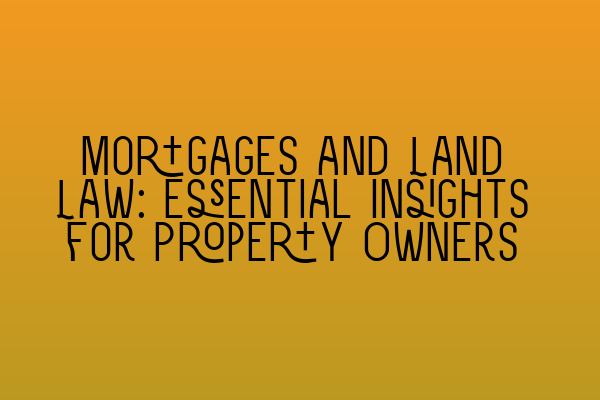Mortgages and Land Law: Essential Insights for Property Owners
Welcome to SQE Property Law & Land Law, where we provide expert legal services and insightful guidance for property owners. Today, we will be diving into the complex world of mortgages and land law, exploring key concepts and essential insights that will help you navigate this area with confidence.
Understanding Mortgages
A mortgage is a legal agreement between a lender and a borrower, where the borrower pledges their property as collateral for the loan. This agreement allows the borrower to access funds for purchasing a property or to secure financing using their existing property.
When you take out a mortgage, the lender will register their interest as a charge against your property. This charge gives the lender certain rights, such as the ability to repossess your property if you fail to make repayments as agreed. It is crucial to note that the lender’s priority in terms of repayment is determined by the order in which their charge was registered.
Types of Mortgages
There are various types of mortgages available to property owners, each with its own nuances and considerations. Let’s explore some of the most common types:
1. Repayment Mortgage: With this type of mortgage, you make regular repayments that cover both the principal amount and the interest. Over time, your debt gradually reduces until it is fully paid off, assuming you make all the agreed repayments.
2. Interest-Only Mortgage: Unlike a repayment mortgage, an interest-only mortgage requires you to pay only the interest for a specific term. The principal amount remains unchanged, and you will need to repay it in full at the end of the term.
3. Fixed-Rate Mortgage: A fixed-rate mortgage offers a set interest rate for a predetermined period, typically between 1 to 5 years. This provides stability and predictability in terms of repayment amounts, regardless of any fluctuations in the market interest rates.
4. Variable-Rate Mortgage: With a variable-rate mortgage, the interest rate can fluctuate over time, depending on changes in the market. This type of mortgage offers flexibility but comes with the risk of increased repayments if interest rates rise.
Legal Considerations in Mortgages and Land Law
As a property owner, it is essential to understand the legal aspects associated with mortgages and land law. Here are some key considerations:
1. Registration of Charges: When you take out a mortgage, it is crucial to register the lender’s charge against your property. This registration ensures that the lender’s rights are protected and that their interest takes priority over subsequent charges.
2. Repossession: If you fail to make the agreed repayments, the lender has the right to repossess your property. However, they must follow the correct legal procedures outlined in the Mortgage Repossessions (England and Wales) Rules 2021. Being aware of your rights and the lender’s obligations can help you navigate this situation effectively.
3. Transfer of Mortgages: It is possible to transfer your mortgage to a new lender, known as a remortgage. This process involves discharging the existing mortgage and registering a new charge in favor of the new lender. Seeking legal advice and understanding the implications is crucial when considering a remortgage.
4. Equity Release: For older property owners looking to access funds tied up in their property, equity release can be an option. This involves unlocking part of the property’s value and is typically achieved through a lifetime mortgage or a home reversion plan. It is crucial to understand the legal implications and seek independent financial and legal advice before proceeding.
Conclusion
In conclusion, understanding mortgages and land law is essential for property owners. From the different types of mortgages available to the legal considerations associated with them, having a firm grasp of these concepts empowers you to make informed decisions and protect your rights.
At SQE Property Law & Land Law, we are here to provide expert guidance and legal services. Whether you require assistance with drafting mortgage agreements, ensuring proper registration of charges, or advice on remortgaging, our team of experienced professionals is here to help.
Looking for more legal insights? Check out these related articles:
– Understanding Contractual Capacity: Rights and Limitations
– Interactive SQE Mock Tests for Contract Law: Test Your Knowledge
– Join Our SQE Contract Law Webinars: Expert Insights and Guidance
– Contract Law Reforms: An Analysis of Recent Changes
– Parties in a Contract: Rights and Responsibilities
Feel free to explore our website for more informative content or get in touch with us to discuss your specific needs. At SQE Property Law & Land Law, we are committed to providing exceptional legal services and expertise to property owners like you.
